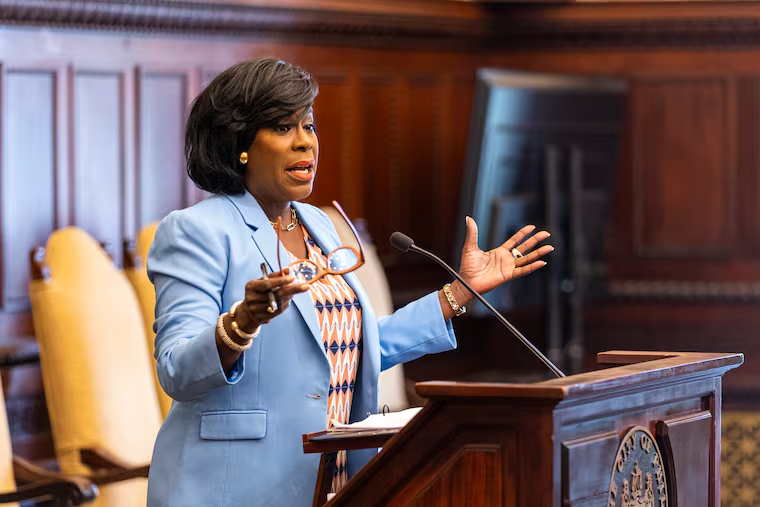Philly was supposed to build housing on the former UC Townhomes site. Mayor Parker’s budget doesn’t fund it.
That's despite a legal settlement reached last year requiring the city acquire the site expressly for its redevelopment into permanent, affordable housing.

Mayor Cherelle L. Parker has said building affordable housing in the city is a top priority, but if her first budget is approved as she proposed it, a West Philadelphia site meant for 70 new units could continue to sit empty.
Parker, who took office in January, proposed her first city budget earlier this year and did not include funding for the redevelopment of the University City Townhomes, a former affordable housing complex on the 3900 block of Market Street that a private landlord controversially closed.
That’s despite a lawsuit settlement between the owners and the city that requires the municipal government to acquire the site expressly for the construction of 70 permanent, affordable units. The agreement, reached last year under former Mayor Jim Kenney, followed a yearslong push by activists to save the low-rise complex.
Now, as budget negotiations between the administration and City Council are underway, Councilmember Jamie Gauthier, who represents West Philadelphia and was named as a defendant in the lawsuit, wants Parker’s administration to reconsider.
“I would think that having 70 units of affordable housing for working-class people in University City is the type of thing that we would want to do as a city,” Gauthier said in an interview. “It’s something that we spent thousands of hours on, it’s something that we’ve promised to the court system and to the broader community, and it’s something that helps us meet our affordable housing goals.”
Gauthier, a progressive, said she’s had several private conversations with administration officials, but has not received a funding commitment. She’s also met with officials from the Philadelphia Housing Authority, who in December requested $14 million from the city to fund the redevelopment.
Nichole Tillman, a spokesperson for PHA, said in a statement that the agency’s interest in developing the property is contingent on the city offsetting the cost. She said PHA is “optimistic” that will happen.
» READ MORE: Cherelle Parker promised 30,000 units of ‘affordable housing’ as a candidate. She’s watered down that goal as mayor.
The mayor’s office didn’t respond to a request for comment. During a March hearing, Chief Deputy Mayor Aren Platt testified to Council that funding to build affordable housing on the site wasn’t in the proposed budget, but that the administration would “tak[e] a hard look at that.”
When Gauthier asked if redeveloping the site is a priority, Platt said he wasn’t “prepared to talk about what type of priority it is for this administration, but building housing is certainly a priority.”
Parker’s administration and members of City Council must come to an agreement on the mayor’s $6.29 billion budget proposal by next month.
The University City Townhomes were located two blocks from the University of Pennsylvania and right next to the Market Frankford line’s 40th Street station.
Built decades ago, when there was little new private-sector development in the area, the townhomes were owned by IBID Associates, a private landlord, and financed by the federal government, like most affordable housing in America.
But the 40-year contract guaranteeing federal subsidies to back the townhomes expired in 2022. So in 2021, IBID decided that there was more money to be made by redeveloping the centrally located property, as opposed to keeping it as affordable housing.
That decision would displace dozens of families and stoked massive controversy. Activist groups occupied the site in protest of the company’s decision.
Gauthier attempted to negotiate with IBID. But when those talks broke down, she introduced zoning legislation to foil their plans. Then the developers sued her in federal court, alleging the city violated their constitutional right to sell the property.
As part of the resolution to that legal impasse, IBID agreed to give one-fifth of the 2.7-acre site to the city for the development of 70 new affordable housing units. Former tenants are to be given right-of-return when the properties are completed. In exchange, the city agreed to exclude the site from Gauthier’s zoning legislation and allowed the demolition to move forward.
But the settlement doesn’t require the city to redevelop the site on any specific timeline. It says only that the parcel should be transferred to the city within 15 days of demolition, which took place in March.
When the settlement was reached last year, Kenney praised it, saying in a statement it would “facilitate equitable development through the preservation of affordable housing in West Philadelphia.” Then-City Solicitor Diana Cortes said the city was “pleased” with the terms.
As part of the settlement, IBID also gave $3.5 million to the city for the tenants’ relocation and housing costs, which amounts to about $50,000 per household. They also received Housing Choice Vouchers, also known as Section 8, for additional rental assistance.